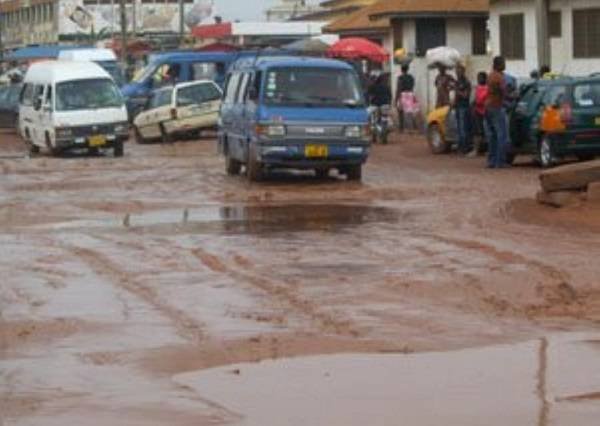Editorial
Government must fix bad roads in Ashaiman

Ashaiman road
Dear Editor,
I write to express my deepest concern regarding the deteriorating road infrastructure in our beloved country, particularly in the capital, Accra.
The dire situation of our roads, exemplified by the alarming condition of the Tema-Motorway, has prompted this urgent appeal for action.
First and foremost, I must commend the government for its responsiveness in addressing the deplorable state of the Tema-Motorway. It is heartening to see that our leaders are attuned to the concerns of the populace and are taking steps to rectify the situation.
However, this is but a single thread in the larger tapestry of road-related challenges that our nation faces.
The Tema-Motorway serves as a microcosm of the issues plaguing our road network.
The very word “motorway” implies a high-speed and efficient route of transportation. Yet, the reality is far from this idyllic image.
Instead, commuters are subjected to a jumble of potholes, cracks, and crumbling asphalt that do not only endanger lives but also impede economic activities.
This dilapidation paints a bleak picture for both the residents of Accra and the countless individuals who rely on this crucial artery for their daily commute.
Moreover, the recent protest by the resilient citizens of Ashaiman on Tuesday, October 3, underscores the widespread anguish caused by our crumbling roads.
These brave individuals took to the streets, in a figurative and literal sense, to voice their discontent. They rightly demand urgent intervention to rehabilitate the road networks that have languished in disrepair for far too long.
The phrase “the squeaky wheel gets the grease” aptly applies here.
It is time for the government to heed the calls of its citizens and address the woeful condition of roads across our nation. Failing to do so would be akin to turning a blind eye to a wildfire that threatens to engulf our collective mobility and economic progress.
I implore the government to consider these concerns with the seriousness they deserve. It is not merely about fixing roads; it is about facilitating the movement of people, goods, and ideas.
Our roads should be the bedrock upon which progress is built, not the stumbling blocks that hinder it. Let us invest in a future where the phrase “bad roads” becomes a relic of the past and where our nation’s infrastructure is a source of pride rather than dismay.
George Obeng Osei, Ashaiman
Editorial
Employ pros at local government level to address sanitation issues
Dear Editor,
In a car on my way to work on Tuesday, I listened to an interview on sanitation on a radio station which a local government expert said that most of the people that handled waste management issues at the Metropolitan, Municipal, and District Assemblies, were not waste management professionals but health professionals.
According to the speaker, this has contributed to the failure to address the sanitation problems, especially at the local level.
These health professionals who have been tasked to oversee waste management are only occupied with the health related dangers but have no clue on the issues at hand.
I felt very sad and found it disturbing as to why people without professional training in waste management is given responsibilities in a field alien to him.
Waste management involves a lot of processes, including segmentation of waste products as well as recycling.
Employers must know that waste management professionals at the local level was important as it helps making decisions ton how to combat it.
This is not a problem at the local government level alone. It is something across the various sectors.
Maybe this is the time for us as a country to start recruiting qualified professionals to occupy their respective fields to bring their competence to the table to solve whatever problem persist.
It is clearly a case of putting ‘square pegs in round holes.’ I believe it is about time we change that narrative and employ professionals who are qualified to find solutions to our waste management conundrum.
Baba Hafiz, Kasoa
Editorial
Concern over mentally ill persons roaming Kwame Nkrumah Circle Interchange
Dear Sir
I write to express my concern over the growing number of mentally ill individuals roaming the Kwame Nkrumah Circle Interchange in Accra.
This area, a vital transportation hub and commercial centre, has increasingly become home to several persons visibly suffering from mental health issues, often without adequate care or supervision.
This situation poses risks both to the affected individuals and the general public. Some of these individuals are exposed to traffic hazards, unsanitary conditions, and in some cases, hostile treatment from passersby.
There have also been reports of occasional erratic behaviour, which causes fear and discomfort among commuters and vendors.
Mental health is a public health issue, and these individuals deserve compassion, medical attention, and a safe environment.
I urge the Ministry of Health, the Accra Metropolitan Assembly, and relevant NGOs to collaborate on a sustainable solution including mental health outreach programmes, rehabilitation, and safe housing.
Kwame Nkrumah Circle should be a symbol of progress, not a place where the vulnerable are left to struggle. Let us act with urgency and humanity.
From John Boateng
Kwame Nkrumah Circle






